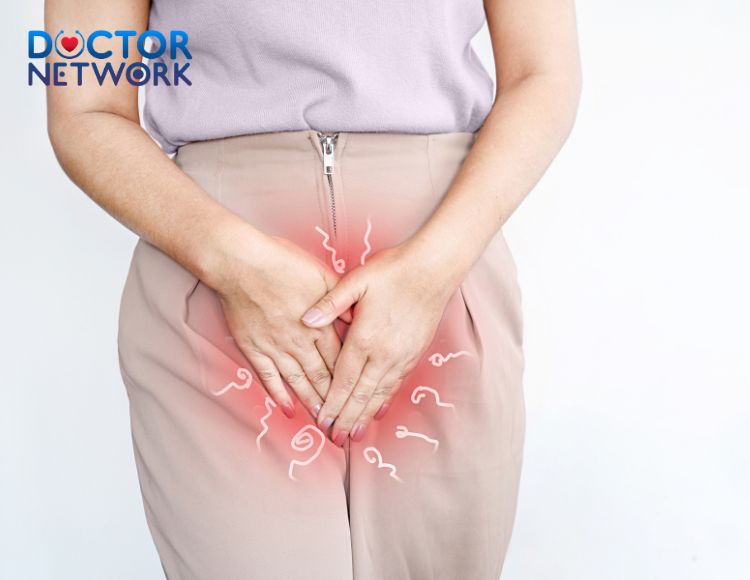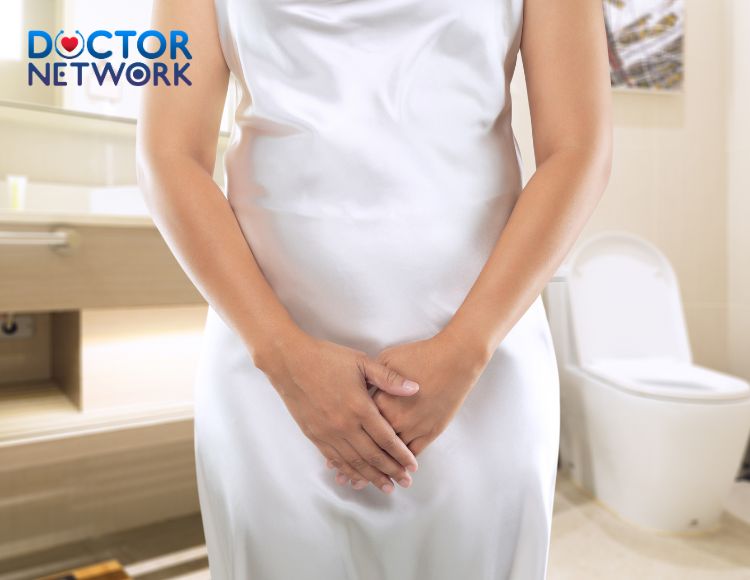The genital area is a sensitive region for women. Any unusual sign, such as a lump on the vulva, can cause anxiety and concern. Understanding the phenomenon of lumps on the genital area helps you determine whether this is a dangerous sign that requires medical attention and treatment.
Symptoms Warning of a Lumps on the Genital Area
In addition to the main symptom of lumps on the genital area, women may experience one or more of the following signs:
- A hard lump in the vagina: The lump can be soft or hard, with varying sizes.
- Multiple lumps: Several lumps may appear simultaneously.
- Pain, swelling, itching, or burning in the genital area.
- Abnormal vaginal discharge in terms of color, odor, and amount.
- The lump may contain pus or fluid.

The lump may contain pus or fluid
Common Causes of Lumps on the Genital Area
Several primary causes of lumps on the genital area include:
- Bartholin’s gland cysts: These glands are located on either side of the vaginal wall and secrete lubricating fluid. When the duct is blocked, fluid accumulates, forming a cyst (which can resolve on its own or require medical intervention).
- Sebaceous cysts: These occur due to overactive sebaceous glands or blocked ducts.
- Folliculitis: Inflammation of hair follicles in the genital area can cause small lumps.
- Gynecological infections: Conditions such as yeast infections, bacterial vaginosis, or viral infections (including genital herpes) can cause lumps.

Conditions such as yeast infections can cause lumps
When to See a Doctor
Most cases of lumps on the genital area are not too dangerous, but you should see a gynecologist if:
- The lump grows larger, becomes painful, and does not improve after a few days.
- Additional abnormal symptoms appear: fever, severe pain, vaginal bleeding, etc.
Diagnosis and Treatment
- Diagnosis: The doctor will perform a gynecological examination, combine it with tests of secretions, ultrasound, etc., to determine the exact cause.
- Treatment:
- Small cysts may resolve on their own. For severe cases, the doctor may drain the fluid, prescribe antibiotics, anti-inflammatory drugs, or perform minor surgery.
- Folliculitis is treated with topical medication and maintaining hygiene.
- Specific gynecological diseases are treated according to the doctor’s instructions.
Prevention of Lumps on the Genital Area
Itchy or painful lumps on the genital area can be limited by:
- Proper hygiene (using clean water or specialized solutions), especially during menstruation.
- Practicing safe and monogamous sex.
- Wearing loose-fitting, good-quality underwear.
- Regular gynecological check-ups every six months.

Regular gynecological check-ups every six months
Frequently Asked Questions about Lumps on the Genital Area
- Are lumps on the genital area dangerous?
- The danger level depends on the cause. In many cases, the lumps are benign (sebaceous cysts, mild folliculitis). However, they can sometimes signal more serious conditions (severe infections, infected Bartholin’s cysts, or sexually transmitted diseases). It’s best to see a gynecologist for an accurate diagnosis.
- Are lumps on the genital area cancerous?
- This possibility is very low. Only a specialist can determine if it’s malignant (cancer) through biopsy and specialized tests. Avoid self-diagnosis to prevent unnecessary worry.
- Can lumps on the genital area resolve on their own?
- This depends on the cause. Some cases, such as small cysts or mild folliculitis, can resolve after a few days. However, if the infection is severe or the lumps do not improve, medical treatment is necessary.
- Are lumps on the genital area contagious?
- Some causes, particularly sexually transmitted diseases like genital herpes, can be contagious. If you suspect this, see a doctor as soon as possible and protect your partner.
- Is the treatment of genital cysts painful?
- Treatments such as medication and fluid drainage are usually not too painful. In cases requiring minor surgery, the doctor will use anesthesia to minimize discomfort.
Scientific Evidence Related to Lumps on the Genital Area
- Prevalence of Bartholin’s Cysts:
- According to the American College of Obstetricians and Gynecologists (ACOG), about 2% of women of reproductive age will experience a Bartholin’s cyst at least once in their lifetime.
- This rate increases to 6% in women over 20 and may be higher in those with a history of gynecological infections.
- Causes of Folliculitis:
- According to the American Academy of Dermatology (AAD), the primary cause of folliculitis in the genital area is the bacterium Staphylococcus aureus (S. aureus).
- Other factors contributing to the risk include shaving, wearing tight clothing, and using skin care products that cause irritation.
- Complications of Genital Herpes:
- According to the Centers for Disease Control and Prevention (CDC), untreated genital herpes can lead to complications such as:
- Chronic ulcers, increasing the risk of HIV transmission.
- Cervical inflammation, increasing the risk of preterm birth in pregnant women.
- Rectal inflammation, affecting bowel function.
- According to the Centers for Disease Control and Prevention (CDC), untreated genital herpes can lead to complications such as:
- Effectiveness of Bartholin’s Cyst Treatment:
- According to a study published in the American Journal of Obstetrics and Gynecology (AJOG), fluid drainage combined with oral antibiotics has a success rate of up to 90% in treating Bartholin’s cysts.
- Minor surgery is only considered when other treatments are ineffective.
- Importance of Regular Gynecological Exams:
- ACOG recommends women have gynecological exams at least once a year, especially those at high risk for sexually transmitted diseases or other gynecological conditions.
- Regular exams help detect early abnormal signs, including lumps on the genital area, for timely intervention.
Never hesitate to see a doctor or self-treat at home when you notice lumps on the genital area. Early diagnosis and treatment by a specialist are the best ways to ensure genital health and rule out serious conditions.
References:
https://www.cosmopolitan.com/uk/body/health/a24607/panickers-guide-to-lumps-and-bumps-0445/
Kiểm Duyệt Nội Dung
More than 10 years of marketing communications experience in the medical and health field.
Successfully deployed marketing communication activities, content development and social networking channels for hospital partners, clinics, doctors and medical professionals across the country.
More than 6 years of experience in organizing and producing leading prestigious medical programs in Vietnam, in collaboration with Ho Chi Minh City Television (HTV). Typical programs include Nhật Ký Blouse Trắng, Bác Sĩ Nói Gì, Alo Bác Sĩ Nghe, Nhật Ký Hạnh Phúc, Vui Khỏe Cùng Con, Bác Sỹ Mẹ, v.v.
Comprehensive cooperation with hundreds of hospitals and clinics, thousands of doctors and medical experts to join hands in building a medical content and service platform on the Doctor Network application.

























